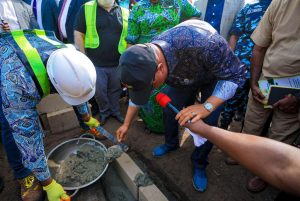By Anamati Inyang
Farming from hand-to-mouth
Despite the abundant arable land and its hardworking population, Akwa Ibom State in Nigeria’s oil-rich South-south region has for many years failed miserably at feeding itself or making substantial gains from agriculture. This is partly because the vast majority of farmers in the state have been practicing subsistence farming for generations, with the knowledge transmitted from grandparents to parents and to children.
Mercy Udo, a mother of five and an indigene of Ibiakpan Abotim in Nsit Ibom Ubium Local Government Area of the state, has been farming her entire life, but it is difficult to say she has profited from her efforts. Udo is one of those who learned farming from her parents and has passed on the knowledge to her children.
“I have been farming for many years and we have experienced good yields but they have not been enough to feed us throughout the year. We still buy food from the market even when we are predominantly farmers,” Udo said. “If we have a better way of farming and tools that would help us achieve better yield, I would readily adopt it and use it in my farm.”
According to Edu Etim, another female farmer from the Ubium clan, crop yield has dropped significantly since the discovery of crude oil in her area. As a result, they are having a difficult time providing for their families.
You can also read – How Akwa Ibom Farmers Are Challenging Northern Nigeria’s Food Production Dominance
According to her, agriculture is not as profitable as it ought to be, adding that there is a serious need to adopt innovative methods in the process of food production. “Since the discovery of crude oil in our area it has become very difficult to have better yields. We are not making good money through farming. We only produce a little and it is not enough to feed our families,” she explained.
People like Udo and Etim, along with countless other farmers, may have been the driving force behind the government’s decision to create a farming system that could revolutionise the lives of all farmers in the state as part of its Arise Agenda.
New dawn, fresh initiative
Under the government’s blueprint, the state is poised for a transformative journey to harness the power of innovative agriculture to strengthen its economy through cutting-edge technologies and sustainable practices that would stimulate job creation, enhance food security, and promote environmental sustainability.
According to the Commissioner for Agriculture and Rural Development, Offiong Offor, one of the key drivers of the planned agricultural revolution is the incorporation of precision farming techniques capable of providing farmers with valuable insights into crop health, soil conditions, and weather patterns. This precision approach not only optimises resource use, but also increases overall crop yields, significantly contributing to the state’s economic prosperity.
The new initiative, Offor said, is committed to assisting smallholder farmers in playing a critical role in this agricultural renaissance. The assistance will take the form of financial incentives, training programmes, and access to modern farming tools to enable local farmers to adopt innovative practices, transforming traditional agriculture into a dynamic and technologically advanced sector.

Offiong Offor, Commissioner for Agriculture & Rural Development, Akwa Ibom State at the launch of Ibom Model Farm on Friday
In addition to traditional crops, the state is diversifying its agricultural portfolio by investing in high-value food crops and cash crops. This strategic shift not only ensures farmers a stable income, but it also opens up new markets and export opportunities. The cultivation of specialty produce, such as organic crops and vegetables, has the potential to propel the state to the status of a regional agricultural powerhouse. Offor insisted that the government would stop at nothing to ensure that farmers in the state became the best in the country, adding that the governor was very eager to make it happen.
You can also read – It’s no longer business as usual for government in Akwa Ibom
Cultivating prosperity
On a bright Friday afternoon last week, thousands of farmers from across the state converged on Ikot Edibon village in Nsit Ubium Local Government Area. The occasion was the groundbreaking ceremony for Ibom Model Farm, a 50,000-hectare farming settlement.
The farm is a multi-purpose facility that aims to boost Akwa Ibom people’s productivity, profitability, and social welfare, and its design is similar to the highly successful Songhai Farm Technology Songhai Farm Technology in Porto-Novo, Benin Republic.
When completed, it will have various sections such as crops, animal husbandry, aquaculture, and agro-processing facilities to extend the value chain, quality, and profitability of the facility’s produce and other output.
While many farmers across the state have embraced the cultivation of highly sought after vegetables such as cucumbers, tomatoes, onions, and watermelons, among others, the model farm will cultivate the best species of these vegetables for domestic consumption and export. To encourage young people to pursue careers in agriculture, the farm will include many complementary facilities such as farm homes, a hotel, a conference hall, a grill pen, and more.
Speaking at the event, Governor Umo Eno expressed enthusiasm for the Ibom Model Farm, emphasizing its role as a training ground for a new generation of farmers and a potential tourist attraction. The governor highlighted the farm’s private operation, managed by the Akwa Ibom Investment Corporation with supervision from the Ministry of Agriculture and Rural Development.

Governor Umo Eno laying the foundation for Ibom Model Farm on Friday
“Ibom Model Farm, beyond its role in food production, is designed to serve as a training ground, nurturing a new generation of farmers, increasing income, and evolving into a prominent tourist site in the region,” the governor told the gathering.
“The farm was conceived during our campaign. I did send 31 people for training and other 31 youth are currently undergoing training outside the state in different agricultural enterprises. I dreamed of a scenario where we can have a coordinated approach to farm for the desired results.
“When professionals run a business with less government interference, the outcome would be tremendous. Therefore, the farm will be privately operated without any government influence as Akwa Ibom Investment Corporation will manage it while it will be supervised by the ministry of agriculture and rural development.”
Akwa Ibom State’s shift towards innovative agriculture signals a new era of prosperity, job creation, and sustainability. The government’s commitment to empowering farmers and embracing advanced techniques positions the state on a trajectory toward economic growth and self-sufficiency.




